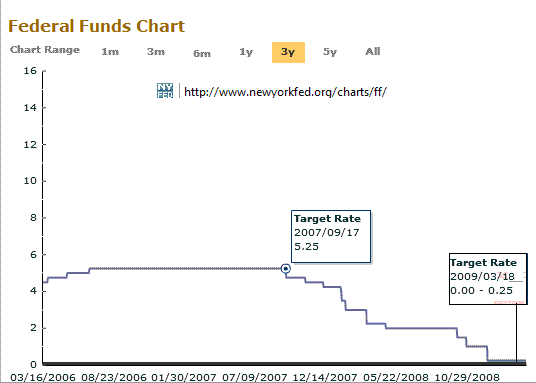Since the financial crisis began in the summer of 2007 the Federal Reserve has resorted to a number of methods to provide support and stability to financial markets and the economy.
The FOMC has acted aggressively as the lender of last resort to provide short term liquidity to the financial system by cutting the target Fed Funds Rate from 5.25% to effectively 0.00% since September 2007.

The Federal Reserve has grown their balance sheet from $869 billion on August 8, 2007 to nearly $2 trillion....

The Fed is providing a liquidity crutch for credit markets via the Commercial Paper Funding Facility, the Asset-Backed Commercial Paper Money Market Mutual Fund Liquidity Facility, the Money Market Investor Funding Facility, the Term Asset-Backed Securities Loan Facility, and the Agency MBS Purchase Program.
Plain and Simple: The Federal Reserve has utilized all their traditional tools and even engaged in emergency quantitative easing efforts to prevent our economy from slipping into a deflationary spiral and full blown depression!!!
What Role Does Housing Play in Economic Recovery?
In almost every recession since World War II housing has been a forward indicator of economic improvement. Housing Data has marginally improved (off of record lows) in the past two months. In order for this trend to continue...given the fact that the Federal Reserve's MBS account is the dominant source of mortgage market support and liquidity (rates would be 1.5% to 2.0% higher without them)....it is imperative that the FOMC strongly considers extending the term of the Agency MBS program upon its conclusion.
FOMC statements have included verbiage that indicates this is already under consideration.
From the January FOMC statement...
"The Federal Reserve continues to purchase large quantities of agency debt and mortgage-backed securities to provide support to the mortgage and housing markets, and it stands ready to expand the quantity of such purchases and the duration of the purchase program as conditions warrant."
We expect the Federal Reserve to indicate that although some improvements have been seen(HOUSING)...consumer spending, industrial production, and the labor market remain quite weak. These key indicators imply that the FOMC should continue to emphasize concern on deflation rather than inflation. Given the strength of the US Dollar and the pullback in energy prices we expect markets may be disappointed to hear that the FOMC's verbiage on purchasing Treasuries may be brief/relatively unchanged from the January statement.
From the January FOMC statement...
"The Committee also is prepared to purchase longer-term Treasury securities if evolving circumstances indicate that such transactions would be particularly effective in improving conditions in private credit markets."
Reminder: we have yet to see the positive effects that TALF may provide credit markets.
Plain and Simple: In regards to mortgage world and your rate sheets...it is far more important that the MBS market remains confident in the Federal Reserve's willingness to extend the duration of the Agency MBS Program if necessary. If at some point global investors lose confidence in the Obama Administration's plan to jump start the economy (still waiting on toxic asset strategy) the Federal Reserve may be forced to influence long term debt yields via Treasury purchases. Given the recent investor demand for US Debt securities this is not a near term concern but may however become one as new recovery plan details are announced.If the statement does not adequately address (in markets eyes) Treasury purchases, mortgages may be indirectly affected by a shift in the yield curve. When considering the big picture, however, the continuance of Fed participation in the MBS market will keep mortgage market liquidity high and investor demand healthy.





